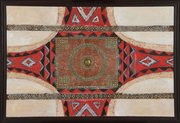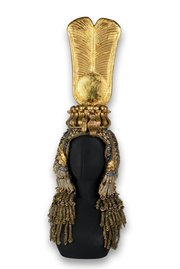
Khwarezmid or Mongol glazed tile
Museum of Islamic Art
- Title:
- Khwarezmid or Mongol glazed tile
- Production place:
- Kashan
- Date:
- 1200 - 1299
- Period:
- Khwarezmid
- Title:
- Khwarezmid or Mongol glazed tile
- Production place:
- Kashan
- Date:
- 1200 - 1299
- Period:
- Khwarezmid
- Material:
- Fritware, Glaze
- Technique:
- Moulding, Glazing
- Dimensions:
- 34.6 × 36 × 5.5 cm
This moulded and turquoise-glazed tile features an upper frieze with interlaced designs and below three repeated arches with hanging lamps. The central arch bears an inscription that reads 'izz wa iqbal wa dawla (Glory and Prosperity and Wealth). Such small tiles, which would be decorative elements on a cenotaph, are reminiscent of the close relationship between mosque mihrabs and funerary decorations. The lower section is not glazed because it was certainly meant to be hidden while securing its location on the cenotaph. As seen on various comparative examples (Royal Ontario Museum 955.129.2, the Victoria and Albert Museum 1511A-1876, Harvard Art Museum 1955.89, and The David Collection Isl 107), the use of turquoise glazing and the association of the mihrab niche with mosque lamps were common features in Kashan’s production of the 7th century AH / 13th century CE. Although the religious inscriptions vary, they often relate to the common metaphor of God and Islam as being symbolically compared with light.



